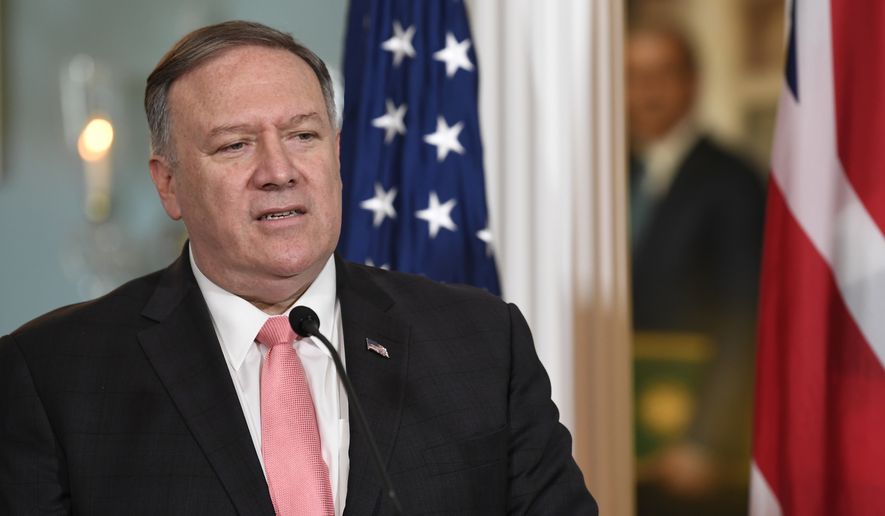Secretary of State Mike Pompeo said Tuesday that the Islamic State remains a “complicated” foreign policy challenge and is actually stronger in some corners of the world today than it was before having its self-proclaimed “caliphate” decimated by U.S.-backed forces in Syria and Iraq.
“There are certainly places where ISIS is more powerful today than they were three or four years ago,” said Mr. Pompeo, who asserted that President Trump “is very focused on making sure that we apply the right resources against the problem.”
Mr. Pompeo’s rare acknowledgment of the Islamic State’s threat, a group President Trump has claimed victory over, came during an interview with “CBS This Morning.”
It also comes after an Islamic State offshoot in Afghanistan carried out a suicide bombing at a wedding in Kabul that killed more than 60 people last weekend.
Mr. Pompeo then touched on the issue later Tuesday in New York at a U.N. Security Council meeting addressing wider Mideast threats. “We helped dismantle ISIS’s physical caliphate,” he told the council, adding that the administration continues to work with dozens of international partners to “help the region recover from that menace.”
But Mr. Pompeo focused the brunt of his remarks at the U.N. on Iran, suggesting the administration’s view is that Tehran represents as urgent a threat as any single extremist group.
“The Islamic Republic of Iran and its proxies continue to foment terror and unrest in Iraq, Lebanon, Syria, and Yemen, with devastating humanitarian consequences,” he said in prepared remarks circulated by the State Department.
Islamic State’s resurgence threatens to undercut one of Mr. Trump’s favorite talking points, and complicate his hopes of pulling U.S. forces entirely out of Syria. While saying eliminating ISIS’s geographical caliphate was a major breakthrough, Mr. Pompeo acknowledged concerns that Islamic State could regroup and resume attacks on U.S. and allied targets.
“The caliphate is gone and their capacity to conduct external attacks has been made much more difficult,” Mr. Pompeo said. “What we’ve always said is the caliphate’s been gone and that there’s always risk that there will be a resurgence, not just from ISIS. There’s risk from al Qaeda [and] other radical Islamic terrorist groups.”
Asked whether ISIS is gaining strength, he said: “It’s complicated.”
The Afghan suicide bombing cast a fresh shadow of the Trump administration’s intensifying diplomacy to strike a deal with the radical Taliban movement in Afghanistan and withdraw the bulk of the 14,000 American troops still deployed there.
The New York Times on Monday reported that Islamic State operatives are gathering strength and conducting guerrilla attacks across Syria and Iraq. A recent Defense Department inspector general report warned that Mr. Trump’s drawdown this year of half of the 2,000 U.S. forces in Syria has meant the American military has had to cut back support for Syrian-based allies still fighting ISIS.
Former Obama administration counterterrorism officials have been among the most vocal in criticizing the administration’s declarations of victory over the Islamic State.
Some analysts have accused the administration trying to reshape the broad anti-ISIS coalition to support Mr. Trump’s strategy to contain Iran.
Brett McGurk, President Obama’s special representative to the anti-ISIS coalition who resigned to protest Mr. Trump’s Syria withdrawal plans, has argued the president “upended” what had been a successful strategy of backing local militias against ISIS, militias needed to prevent a comeback for the terror group.
“The strategy that Trump dismantled offered the United States its only real chance … [at] preventing an ISIS resurgence,” Mr. McGurk wrote in an essay in the May/June issue of Foreign Affairs magazine.
• Guy Taylor can be reached at gtaylor@washingtontimes.com.




Please read our comment policy before commenting.